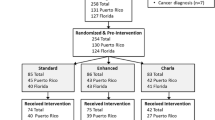Abstract
Background. This community-based intervention study examined the effects of 2 different message strategies for presenting information about the prostate specific antigen (PSA) test. Methods. A quasi-experimental longitudinal design with 2 intervention and 1 control group. Results. Knowledge increased significantly among participants who received either version of the intervention message and remained elevated at 12 months. Presenting information in the context of other men’s health issues was associated with greater increases in knowledge relative to PSA only. Conclusions. Community-based interventions can increase knowledge about prostate cancer screening. Clinicians need to take careful account of what their patients understand and correct misperceptions.
Similar content being viewed by others
References
Harris R, Lohr KN. Screening for prostate cancer: an update of the evidence for the U.S. Preventive Services Task Force. Ann Intern Med. 2002;137:917–929.
U.S. Preventive Services Task Force (USPSTF). Screening for prostate cancer: recommendation and rationale. Ann Intern Med. 2002;137:915–916.
Finney Rutten LJ, Meissner HI, Breen N, et al. Factors associated with men’s use of prostate-specific antigen screening: evidence from Health Information National Trends Survey. Prev Med. 2005;40:461–468.
Diefenbach PN, Ganz PA, Pawlow AJ, et al. Screening by the prostate-specific antigen test: what do the patients know? J Cancer Educ. 1996;11:39–44.
Flood AB, Wennberg JE, Nease RF Jr. The importance of patient preference in the decision to screen for prostate cancer. Prostate Patient Outcomes Research Team. J Gen Intern Med. 1996;11: 342–349.
Frosch DL, Kaplan RM, Felitti V. The evaluation of two methods to facilitate shared decision making for men considering the prostate-specific antigent test. J Gen Intern Med. 2001;16:391–398.
Steele CB, Miller DS, Maylahn C, Uhler RJ, Baker CT. Knowledge, attitudes, and screening practices among older men regarding prostate cancer. Am J Public Health. 2000;90:1595–1600.
Volk RJ, Cass AR, Spann SJ. A randomized controlled trial of shared decision making for prostate cancer screening. Arch Fam Med. 1999;8:333–340.
Zemencuk JK, Hayward RA, Katz SJ. The benefits of, controversies surrounding, and professional recommendations for routine PSA testing: what do men believe? Am J Med. 2001;110:309–313.
Wilt TJ, Paul J, Murdoch M, et al. Educating men about prostate cancer screening. A randomized trial of a mailed pamphlet. Eff Clin Pract. 2001;4:112–120.
Briss P, Rimer B, Reilley B, et al. Task Force on Community Preventive Services. Promoting informed decisions about cancer screening in communities and healthcare systems. Am J Prev Med. 2004;26:67–80.
Volk R, Hawley S, Kneuper S, et al. Trials of decision aids for prostate cancer screening. Am J Prev Med. 2007;33:428–434.
Barry MJ. Health decision aids to facilitate shared decision making in office practice. Ann Intern Med. 2002;136:127–135.
Merrill RM. Demographics and health-related factors of men receiving prostate-specific antigen screening in Utah. Prev Med. 2001;33:646–652.
Moran WP, Cohen SJ, Preisser JS, et al. Factors influencing use of the prostate-specific antigen screening test in primary care. Am J Manag Care. 2000;6:315–324.
Swan J, Breen N, Coates RJ, et al. Progress in cancer screening practices in the United States: results from the 2000 National Health Interview Survey. Cancer. 2003;97:1528–1540.
Evans R, Edwards A, Brett J, et al. Reduction in uptake of PSA tests following decision aids: systematic review of current aids and their evaluations. Patient Educ Couns. 2005;58:13–26.
Slovic P. The construction of preferences. Am Psychol. 1995; 50:364–371.
Kahneman D, Tversky A. Choices, values and frames. Am Psychol. 1984;39:314–350.
Holtgrave D, Tinsley B, Kay L. Encouraging, Risk Reduction in Designing Health Messages. Thousand Oaks, CA: Sage Publications; 1995.
Bandura A. Self-efficacy: The Exercise of Control. New York: WH Freedman and Co; 1997.
Soloe, CS, McCormack, LA, Treiman, KA, et al. Informed decision making about PSA testing: findings and implications from formative testing of a multi-modal intervention. Research Triangle Park, NC: RTI Press; 2009.
Radosevich DM, Partin MR, Nugent S, et al. Measuring patient knowledge of the risks and benefits of prostate cancer screening. Patient Educ Couns. 2004;54:143–152.
Driscoll D, Harris-Kojetin L. Final patient messages for prostate-specific antigen (PSA) screening for prostate cancer, Medicare screening messages project. Final report to AHRQ/CMS. Research Triangle Park, NC: RTI International; 2002.
Schwartz LM, Woloshin S, Fowler FJ Jr, et al. Enthusiasm for cancer screening in the United States. JAMA. 2004;291:71–78.
Driscoll, DL, Rupert, DJ, Golin, CE, et al. Promoting PSA informed decision-making: evaluating two community-level interventions. Am J Prev Med, 2008;35(2):87–94.
Mullen PD, Allen JD, Glanz K, et al. Measures used in studies of informed decision making about cancer screening: a systematic review. Ann Behav Med. 2006;32:188–201.
Liang KY, Zeger SL. Longitudinal data analysis using generalized linear models. Biometrika. 1986;73:13–22.
Man-Son-Hing M, O’Connor AM, Drake E, et al. The effect of qualitative vs. quantitative presentation of probability estimates on patient decision-making: a randomized trial. Health Expect. 2002;5:246–255.
Gurmankin AD, Baron J, Hershey JC, et al. The role of physicians’ recommendations in medical treatment decisions. Med Decis Making. 2002;22:262–271.
Author information
Authors and Affiliations
Corresponding author
Additional information
RTI International is a trade name of Research Triangle Institute.
This publication was made possible through the Centers for Disease Control and Prevention (CDC) and the Association for Prevention Teaching and Research (APTR) Cooperative Agreement, No. U50/ CCU300860, Project TS-0845. The findings and conclusions in this publication are those of the author(s) and do not necessarily represent the views of the Centers for Disease Control and Prevention or the Association for Prevention Teaching and Research.
Rights and permissions
About this article
Cite this article
McCormack, L.A., Bann, C.M., Williams-Piehota, P. et al. Communication message strategies for increasing knowledge about prostate cancer screening. J Canc Educ 24, 238–243 (2009). https://doi.org/10.1080/08858190902935498
Issue Date:
DOI: https://doi.org/10.1080/08858190902935498




